
The Original Dixieland Jass Band (ODJB) was a Dixieland jazz band that made the first jazz recordings in early 1917. Their "Livery Stable Blues" became the first jazz record ever issued. The group composed and recorded many jazz standards, the most famous being "Tiger Rag". In late 1917, the spelling of the band's name was changed to Original Dixieland Jazz Band.

Mary Flannery O'Connor was an American novelist, short story writer and essayist. She wrote two novels and 31 short stories, as well as a number of reviews and commentaries.

Soul jazz or funky jazz is a subgenre of jazz that incorporates strong influences from hard bop, blues, soul, gospel and rhythm and blues. Soul jazz is often characterized by organ trios featuring the Hammond organ and small combos including saxophone, brass instruments, electric guitar, bass, drums, piano, vocals and electric organ. Its origins were in the 1950s and early 1960s, with its heyday with popular audiences preceding the rise of jazz fusion in the late 1960s and 1970s. Prominent names in fusion ranged from bop pianists including Bobby Timmons and Junior Mance to a wide range of organists, saxophonists, pianists, drummers and electric guitarists including Jack McDuff, Eddie "Lockjaw" Davis, and Grant Green.
Charles Luckyth Roberts, better known as Luckey Roberts, was an American composer and stride pianist who worked in the jazz, ragtime, and blues styles. Roberts performed as musician, band/orchestra conductor, and dancer. He taught music and dance. He also owned a restaurant and bar in New York City and in Washington, D.C. Luckey Roberts noted compositions include "Junk Man Rag", "Moonlight Cocktail", "Pork and Beans" (1913), and "Railroad Blues".

Jack Selig Yellen was an American lyricist and screenwriter. He is best remembered for writing the lyrics to the songs "Happy Days Are Here Again", which was used by Franklin Roosevelt as the theme song for his successful 1932 presidential campaign, and "Ain't She Sweet", a Tin Pan Alley standard.

Wonga Philip Harris was an American actor, comedian, singer and songwriter. He was an orchestra leader and a pioneer in radio situation comedy, first with The Jack Benny Program, then in The Phil Harris-Alice Faye Show in which he co-starred with his wife, singer-actress Alice Faye, for eight years. Harris is also noted for his voice acting in animated films. As a voice actor, he played Baloo in The Jungle Book (1967), Thomas O'Malley in The Aristocats (1970), Little John in Robin Hood (1973), and Patou in Rock-a-Doodle (1991). As a singer, he recorded a #1 novelty hit record, "The Thing" (1950).

Blind Willie Johnson was an American gospel blues singer, guitarist and evangelist. His landmark recordings completed between 1927 and 1930—thirty songs in total—display a combination of powerful "chest voice" singing, slide guitar skills, and originality that has influenced generations of musicians. Even though Johnson's records sold well, as a street performer and preacher, he had little wealth in his lifetime. His life was poorly documented, but over time, music historians such as Samuel Charters have uncovered more about Johnson and his five recording sessions.
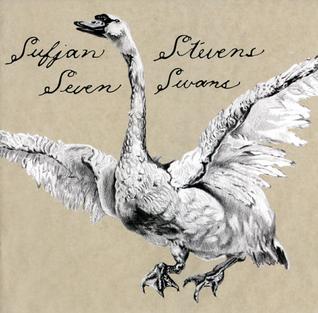
Seven Swans is a folk rock music album by Sufjan Stevens, released on March 16, 2004 on Sounds Familyre Records. It is Stevens' fourth studio album and features songs about Christian spiritual themes, figures such as Abraham, and Christ's Transfiguration. The songs are primarily "lush acoustic compositions" with Stevens' banjo. It was recorded and produced by Daniel C. Smith, Sufjan's close friend. The album was released on compact disc by Sounds Familyre Records and vinyl LP; the vinyl was released by Burnt Toast Vinyl.
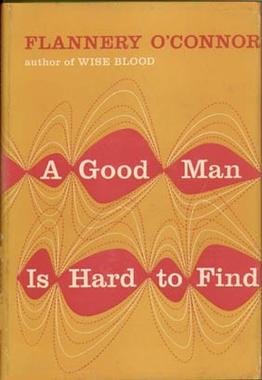
A Good Man Is Hard to Find and Other Stories is a collection of short stories by American author Flannery O'Connor. The collection was first published in 1955. The subjects of the short stories range from baptism to serial killers to human greed and exploitation. The majority of the stories include jarring violent scenes that make the characters undergo a spiritual change. The short stories commonly have tones of Catholicism related to life and death scenarios. For instance, in the story "A Good Man Is Hard To Find" the villain states, "She would have been a good woman if it had been somebody there to shoot her every minute of her life."

Roy James Brown was an American blues singer who had a significant influence on the early development of rock and roll and the direction of R&B. His original song and hit recording "Good Rockin' Tonight" has been covered by many artists including Wynonie Harris, Elvis Presley, Bruce Springsteen, Paul McCartney, Joe Ely, Ricky Nelson, Jerry Lee Lewis, Pat Boone, James Brown, the Doors, and the rock group Montrose. Brown was one of the first popular R&B singers to perform songs with a gospel-steeped delivery, which was then considered taboo by many churches. In addition, his melismatic, pleading vocal style influenced notable artists such as B.B. King, Bobby Bland, Elvis Presley, Jackie Wilson, James Brown and Little Richard.

"Good Rocking Tonight" is a jump blues song originally released in 1947 by its writer, Roy Brown and was covered by many recording artists. The song includes the memorable refrain, "Well I heard the news, there's good rocking tonight!" The song anticipated elements of rock and roll music.
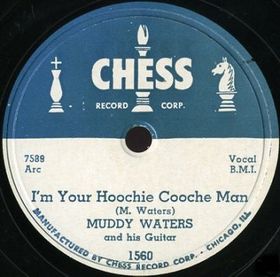
"Hoochie Coochie Man" is a blues standard written by Willie Dixon and first recorded by Muddy Waters in 1954. The song makes reference to hoodoo folk magic elements and makes novel use of a stop-time musical arrangement. It became one of Waters' most popular and identifiable songs and helped secure Dixon's role as Chess Records' chief songwriter.
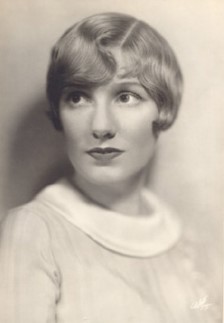
Marion Harris was an American popular singer who was most successful in the late 1910s and the 1920s. She was the first widely-known white singer to sing jazz and blues songs.

"A Good Man Is Hard to Find" is a Southern gothic short story first published in 1953 by author Flannery O'Connor who, in her own words, described it as "the story of a family of six which, on its way driving to Florida [from Georgia], is slaughtered by an escaped convict who calls himself the Misfit".
The bibliography of Flannery O'Connor includes two novels, more than thirty short stories, and several collections.

"Livery Stable Blues" is a jazz composition copyrighted by Ray Lopez and Alcide Nunez in 1917. It was recorded by the Original Dixieland Jass Band on February 26, 1917, and, with the A side "Dixieland Jass Band One-Step" or "Dixie Jass Band One-Step", became widely acknowledged as the first jazz recording commercially released. It was recorded by the Victor Talking Machine Company in New York City at its studio at 46 West 38th Street on the 12th floor – the top floor.
De Armand Alexander "Eddie" Noack, Jr., was an American country and western singer, songwriter and music industry executive. He is best known for his 1968 recording of the controversial murder ballad, "Psycho", written by Leon Payne, produced by John Capps and issued on the K-ark Records label.
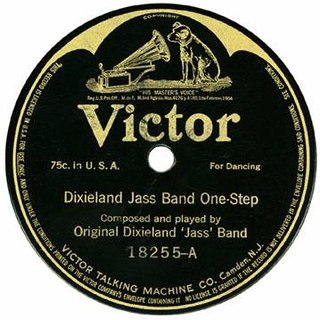
"Dixieland Jazz Band One-Step" also known as "Dixie Jass Band One-Step" and "Original Dixieland One-Step" is a 1917 jazz composition by the Original Dixieland Jass Band released as an instrumental as a Victor 78. The song is a jazz milestone as the first commercially released "jass" or jazz song.
A Good Man Is Hard To Find may refer to:















